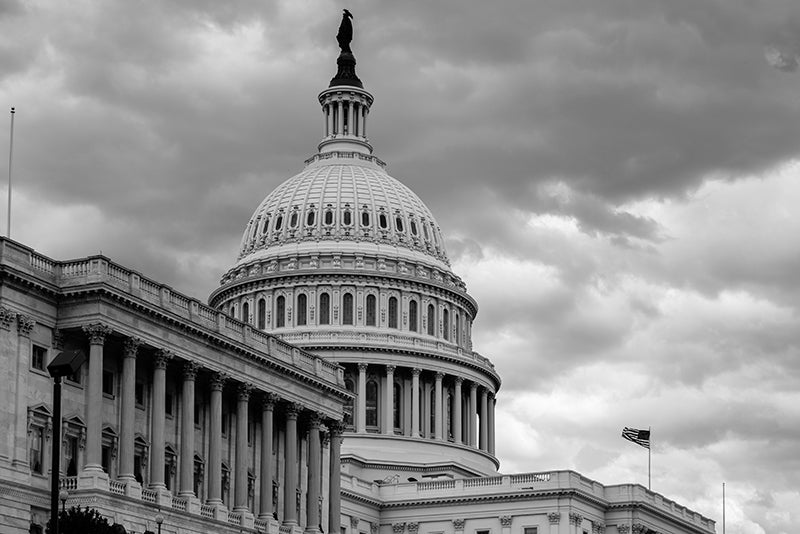House Republicans’ ‘Polluter Profits’ Week Continues Putting Corporate Profits Over People
We can’t afford to waste time doubling down on a failed status quo.
As the clock ticks on a deal needed to avert a possible government shutdown this Friday, House Republicans seem wholly unconcerned. Instead, they’ve turned their attention to ‘Energy Week,’ a hastily cobbled together assortment of energy and anti-environmental bills that imperil our right to clean air and water, stifle our progress on environmental justice, and provide even more handouts to fossil fuel companies that are already swimming in record profits. At a time when climate change demands a rapid transition to clean energy, we can’t afford to waste time doubling down on a failed status quo. Here’s how House Republican’s ‘Energy Week’ is looking more like a ‘Polluter Profits Week’ rather than tackling the true challenges facing the energy sector:
Endangering Clean Water Protections
Despite its name, the Creating Confidence in Clean Water Permitting Act does nothing to create confidence in our clean water protections. In fact, it takes a hatchet to the Clean Water Act and actively undermines the ability of federal agencies to protect the water resources that all of us rely on to survive. Communities of color, Indigenous communities, and low-income communities already face incredible barriers to accessing clean water, and many of those barriers are directly connected with polluting industries that have often polluted water sources with impunity. Instead of strengthening the ability of the Environmental Protection Agency to update water criteria and actively engage communities and stakeholders on potential projects, the bill would curtail EPA’s ability to use its authority in the public interest while effectively shielding industry from judicial review. If passed, polluters would face little accountability from the federal government for destroying wetlands and critical habitats, dumping toxic PFAS into our waterways, or contaminating water resources while community groups and individuals would face limited options in our courts.
Handouts to the fossil fuel industry
When President Biden and Congressional Democrats passed the Inflation Reduction Act, it included significant fiscal reforms on oil and gas leasing that raise royalty rates on oil and gas drilling on our public lands while requiring industry — not taxpayers — to clean up their messes. After the Bureau of Land Management issued a new rule implementing these reforms, House Republicans remain hell-bent on overturning them. The Restoring American Energy Dominance Act would withdraw the BLM’s proposed rule and cave to the demands of the oil and gas industry that want us — taxpayers — to subsidize their operations and clean up their toxic pollution after they finish extraction on public lands. If that weren’t enough, the House is also considering bills to block President Biden’s ability to ban fracking — despite no intention to do so from the President — and repeal the Methane Emissions Reduction Program (MERP) that is already in line with industry standards and critical to tackling climate change. This repeal would further harm our ability to hold oil and gas companies accountable for their emissions and pollution while inhibiting our ability to meet our climate and environmental justice goals.
Repealing popular Inflation Reduction Act investments in disadvantaged communities
The IRA recognized the importance of investing in communities directly facing the negative impacts of climate change and environmental injustice. It created the Greenhouse Gas Reduction Fund to drive investment and empower communities into leading and funding their own projects to lower greenhouse gas emissions. Additionally, it will unlock access to rooftop and community solar programs for millions of low-income families across the country who are already disproportionately impacted by both the climate crisis and high energy costs. Analysts suggest that in addition to its positive climate impacts, the fund will directly create over 1 million jobs over the course of a decade — including 380,000 jobs in low-income and disadvantaged communities. Despite these benefits, House Republicans are looking to repeal these popular investments and leave many communities of color, Indigenous communities, and low-income communities without the necessary funding to implement these projects.
Blocking clean air standards that keep communities safe
When the Biden administration finalized a landmark particulate matter rule that set stronger standards for deadly soot pollution, House Republicans immediately tried to block its implementation. This week, they’re leading a markup of The Air Quality Standards Implementation Act that would weaken the Clean Air Act, severely limit the use of science-based decision making, and put polluter profits over our right to clean air. This legislation conveniently ignores the facts. The new particulate matter standards will save thousands of lives each year and reduce the number of hospital visits for respiratory related illnesses. Breathing healthy air shouldn’t be partisan, and attacking these lifesaving standards will only worsen air quality in favor of profits.
Instead of enacting an industry wishlist that undermines our climate progress, exacerbates harmful pollution, and undermines critical environmental protections, Congress should focus instead on the myriad challenges we face from combatting climate change and preventing species extinction to advancing environmental justice. What should be clear to the American public by now is that House leadership is more interested in performative political messaging than legislating with actual solutions.
Established in 1989, Earthjustice's Policy & Legislation team works with champions in Congress to craft legislation that supports and extends our legal gains.
